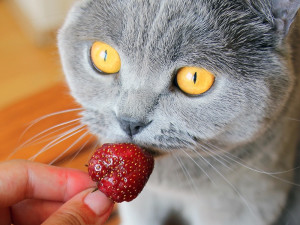Can Cats Eat Oranges?
The question should be: Do they want to?

Share Article
Yes, oranges are safe for cats to eat, but the truth is that most cats are turned off by the smell of citrus and will have no interest in eating it. While oranges do contain some healthy nutrients for cats, they also have some unhealthy effects on cats. Read on to learn more about oranges and cats.
Nutrition facts about oranges for cats
Oranges are the fruit from the Citrus sinensis tree. These trees originated in tropical parts of Asia and have been farmed to create hybrids that are especially sweet and hardy. Oranges are hydrating, fibrous, and contain many important vitamins and minerals. Some of these nutrients are beneficial to cats as well.
Are oranges good for cats?
Overall, oranges are not considered to be good for cats. Cats are obligate carnivores and need to get the bulk of their diet from meat sources that are rich in protein and fat along with other specific nutrients. That said, if you do have a cat that enjoys the occasional bite of an orange, here are some of the benefits oranges can provide:
Fiber: Oranges are high in fiber, an important carbohydrate that has many digestive health benefits. Fiber helps to bulk up the stool, prevent constipation, and provides nutrients to the beneficial microbes of the gut.
Water content: Oranges are about 86 percent water, so they can be a hydrating snack. Cats do not tend to drink much water so finding ways to increase their water intake can be helpful. This is especially important if they have certain health conditions like urinary tract problems or kidney disease.
Vitamins and minerals: Oranges are rich in vitamin C, calcium, potassium, thiamine, and folate. Cats, unlike us, can synthesize their own vitamin C so they do not need to get it from their diet. However, they can benefit from many of the other vitamins and minerals found in oranges.
Can cats eat any part of the orange plant?
No, the plant itself is considered to be toxic to cats. While the fruit is safe for cats to eat, they should not eat the skin of the fruit or any other part of the tree including leaves, or stems. This is due to compounds found in the plant called psoralens, as well as the essential oils within the plant.

These compounds can cause irritation and painful inflammation of the skin, as well as digestive upset including vomiting and diarrhea if consumed. It makes sense that cats tend to have an aversion to oranges; they often really dislike the smell and have no interest in eating them. This is an evolutionary strategy for many animals; they are instinctively turned off to foods that are poisonous or dangerous to them.
Are oranges completely safe for cats?
Oranges are not completely safe for cats. The plant material is considered toxic to them, and only the fruit itself is safe for them to eat And while the fruit is technically safe, there are reasons to be cautious:
Toxic compounds: The skin of the fruit and the plant itself contain compounds that can cause irritation to your cat’s skin as well as digestive upset if consumed, so be sure to keep these parts out of reach.
High-sugar content: Oranges are high in sugar and cats do not metabolize sugar well. They can be at risk for weight gain, diabetes, and other health complications if they eat a lot of sugar.
Fiber: While fiber has many benefits, eating too much of it in a short amount of time can cause digestive upset, especially if they are not accustomed to it. This includes vomiting, diarrhea, bloating, and gas.
Beware of citrus essential oils: While fresh orange fruit is safe in moderation, products containing citrus oils may be toxic and should be avoided. This includes prepared foods as well as essential oils meant to be used as sprays or diffused in a home.
The bottom line: Can cats eat human food?
Cats can eat human food and there are many foods that you can safely share with your cat. It is important to confirm that new foods are safe and healthy for your cat and to know which foods are toxic and should be kept far out of reach. And while sharing the occasional table scrap with your cat can be a fun bonding activity, it is also important to ensure your cat gets the bulk of their diet from a complete and balanced cat food.
Cats have very unique nutritional requirements compared to humans and even dogs, so in order for them to meet all of their needs and be their healthiest, they need a diet that is curated just for them. By keeping treats and table snacks to a minimum, you can ensure that your cat gets enough of the nutrients they really need from their balanced diet and that they are not unintentionally overfed.
Because many indoor cats tend to be less active, they are more at risk for weight gain and related health problems if they also overeat. For cats who are highly food-motivated, occasional snacks and treats can provide the perfect way to get them moving with interactive toys and food puzzles too.
Other foods that are safe for cats
Tuna can be a healthy snack in small amounts.
Carrots can also be a safe option for a crunchy snack.
Low-sodium ham can also be a special treat once in a while.
Other foods that are dangerous for cats
Chocolate is toxic for cats and should be kept out of reach.
Butter is not healthy for cats and should be avoided, too.
Grapes and raisins are also toxic for cats.
FAQ (People also ask):
How much orange can a cat eat?
Cats should only eat small amounts of orange as they are high in sugar and fiber.
Is it OK to give cats oranges?
While orange fruit is not toxic to cats, many cats are turned off by the smell and will not want to taste it.
Why do cats like oranges?
Most cats do not like oranges.
Can cats eat oranges?
Yes, the fruit itself is safe for cats to eat.
Can cats eat any part of the orange plant?
No, only the fruit is safe for cats to eat. The skin of the orange, the leaves, and all other parts of the plant are considered toxic to cats.
References:

Dr. Amy Fox, DVM
Amy Fox, DVM is a small animal veterinarian in New York City with over thirteen years of experience in a mixture of general practice, emergency medicine, and shelter medicine. A lifelong animal lover, Dr. Fox studied biology in college and then worked as a veterinary nurse before pursuing veterinary school at Cornell University. Her expertise includes surgery, dentistry, and management of chronic conditions, and she is interested in toxicology, pain management, nutrition, care of senior pets, and educational outreach. Dr. Fox also enjoys writing about veterinary medicine and teaching, and her work has previously appeared in Spruce Pets. In her free time, she loves to cook, garden, go for long runs, and hang out with her goofy mixed-breed dog May, who provides never ending comic relief!
Related articles
![Orange cat sniffing cut up mango fruit.]()
Can Cats Eat Mango?
It is the perfect healthy treat for you, but what about them?
Can Cats Eat Ice Cream?
They just want a little treat.
![Woman with tattoos eating noodles on the couch with her cat]()
Can Cats Eat Garlic?
It’s a human cooking staple, but your cat shouldn’t indulge.
Can Cats Eat Pork?
They want in on those barbecue bites...
![cat with a person eating a hot dog]()
Can Cats Eat Hot Dogs?
Find out of if your kitty can come to the barbecue this summer.
Can Cats Eat Sweet Potatoes?
Yep—but the plainer, the better. Here’s why.









